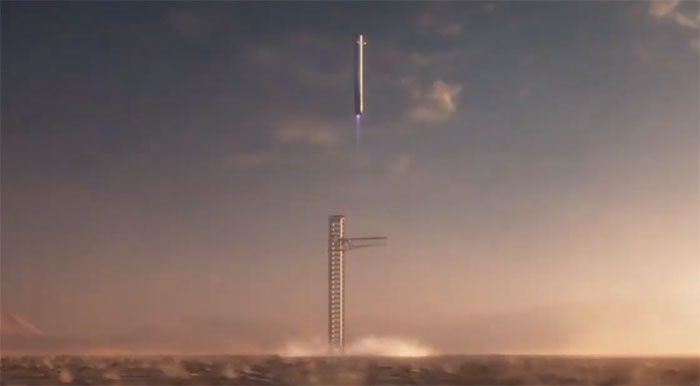The startup Cosmoleap will develop a reusable rocket that can be recovered using a system of robotic arms similar to SpaceX’s Starship.
Simulation of the Yueqian rocket in action. (Video: Cosmoleap)
Cosmoleap, a startup from China, announced that it has raised over $14 million to develop the Yueqian reusable rocket and recovery system, as reported by Interesting Engineering on November 5. A simulation video of Yueqian reveals a design very similar to SpaceX’s Starship launch system. The Yueqian rocket falls from the sky before being captured by a pair of robotic arms. Last month, SpaceX made history by recovering the first stage of the Starship, the Super Heavy rocket, mid-air using its launch tower.
The full name of Cosmoleap is Beijing Dahang Transfer Technology Company, founded in March 2024. The company appears quite ambitious starting with a project similar to SpaceX’s Starship launch system. They have successfully convinced investors of their necessary qualifications and experience. Shenergy Chengyi, Tiangchuang Capital, Legend Capital, and several other investment firms have participated in this funding round.
Although it closely resembles Starship, the Yueqian rocket from Cosmoleap does not aim for Mars. Instead, Cosmoleap is developing the rocket to support the construction of a satellite internet network. Starship is also designed to deploy SpaceX’s second version of Starlink satellites. Cosmoleap plans to conduct the first test flight of Yueqian in 2025 or 2026.

The Chinese startup Cosmoleap is developing the Yueqian reusable rocket and recovery system.
The plans for Cosmoleap may be overly ambitious for a company that has never flown into orbit before. However, the Yueqian will be much smaller than Starship. This rocket is only 75 meters tall, compared to Starship’s height of 121 meters. Yueqian can carry 10,460 kg of cargo to low Earth orbit, which will decrease to 6,280 kg when recovering the first stage.
In fact, Cosmoleap is planning to build a rocket larger than Starship, with a height of 126 meters. According to the company, this vehicle could carry 100 tons of cargo to low Earth orbit and 36 tons when reused. This new rocket is set to launch for the first time in 2030. If successful, it will be the largest rocket in the world. Cosmoleap hopes to achieve impressive milestones similar to those of SpaceX.


















































